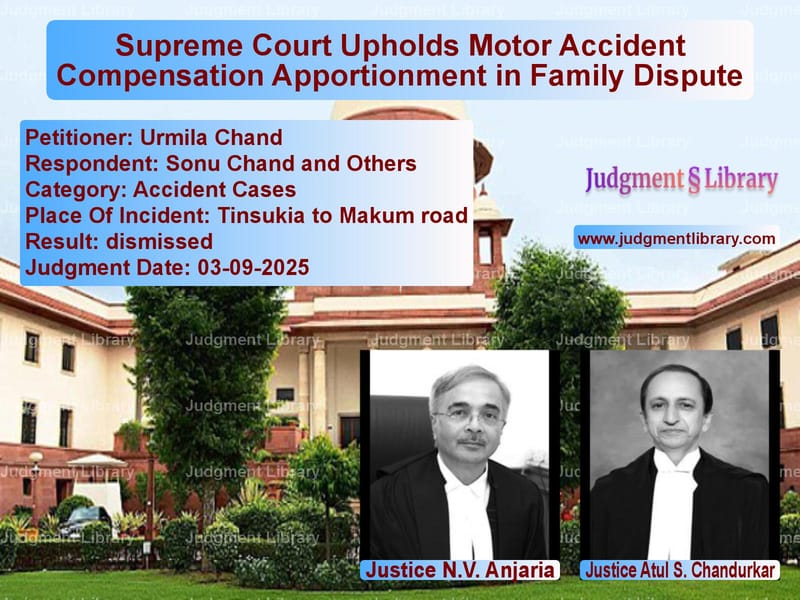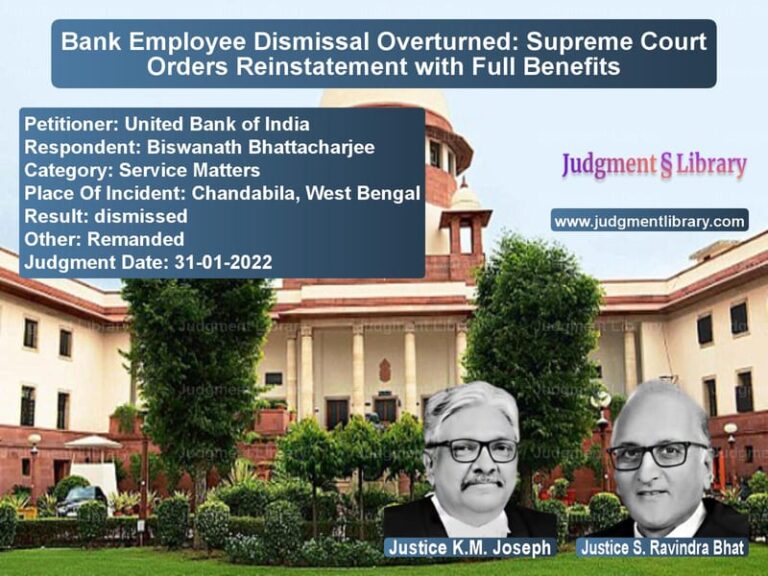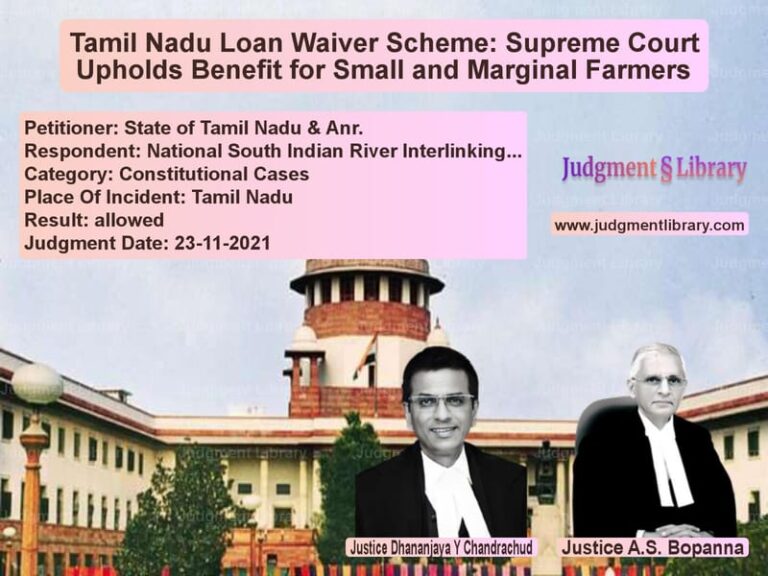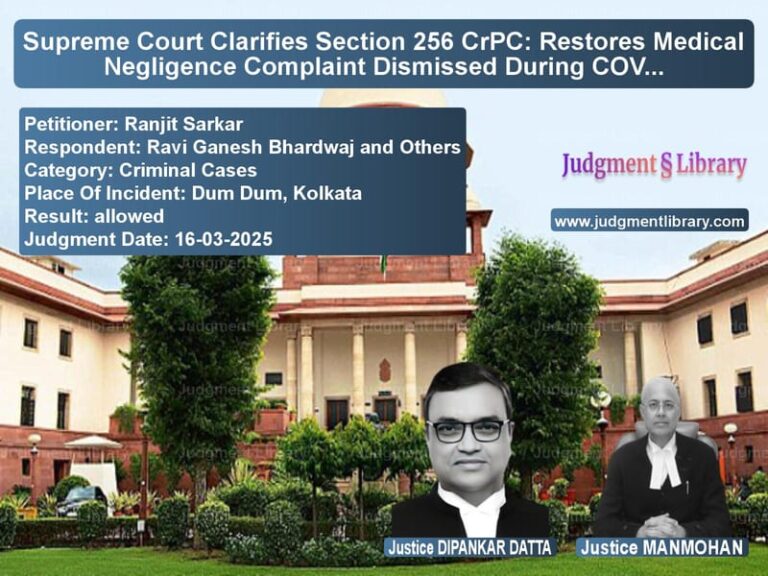Supreme Court Upholds Motor Accident Compensation Apportionment in Family Dispute
In a significant ruling that underscores the importance of finality in legal proceedings and the binding nature of voluntary acceptance of court orders, the Supreme Court of India recently delivered a judgment that brings closure to a long-standing family dispute over motor accident compensation. The case involved Urmila Chand, a mother who challenged the apportionment of compensation received after her son’s tragic death in a road accident.
The unfortunate incident dates back to February 27, 2009, when Priyank Chand lost his life in a vehicular accident. He was traveling in an Indica car from Tinsukia to Makum when a truck collided with the vehicle, causing fatal injuries. The tragedy left behind a grieving family consisting of his mother Urmila Chand (the appellant), his wife Sonu Chand, and their two minor children.
Following the accident, the family filed Motor Accident Claim Case No. 125 of 2009 before the Motor Vehicle Claims Tribunal in Tinsukia. After due proceedings, the Tribunal awarded a total compensation of Rs. 11,82,000 to the four claimants. The insurance company initially challenged this award before the Gauhati High Court but ultimately lost the appeal, and the Tribunal’s award was upheld.
Read also: https://judgmentlibrary.com/supreme-court-enhances-compensation-for-100-disabled-accident-victim/
The crux of the dispute emerged when the compensation amount was disbursed among the family members. On April 21, 2015, the Tribunal passed a disbursement order whereby Urmila Chand received Rs. 1,00,000, while her daughter-in-law Sonu Chand received Rs. 6,26,000. Additionally, Rs. 3,00,000 each was directed to be kept in fixed deposits in the names of the two minor grandchildren.
What made this case particularly interesting was that the disbursement was made based on a joint application filed by all claimants, including Urmila Chand herself. The application specifically contained a prayer to allow the claimants to withdraw the amount of compensation without indicating the share of the parties. Most significantly, Urmila Chand accepted the cheque of Rs. 1,00,000, encashed it, and even put her signature on the order sheet confirming the receipt of the amount.
However, subsequently, Urmila Chand developed grievances about the disbursement and filed a review petition against the Tribunal’s order. This review petition came with a delay of 6 months and 22 days, which she sought to explain by stating that she had undergone surgery during the period from May 25, 2015 to December 9, 2015. The Tribunal dismissed the review application, holding that the appellant was unable to show any document to substantiate the ground of medical illness or about having undergone the surgery.
When the matter reached the Supreme Court, both parties presented their arguments through their legal representatives. The appellant’s counsel, Mr. Pranav Sachdeva, made several key submissions. He argued that “the Tribunal as well as the High Court erred in not condoning the delay of 6 months.” He further contended that “the order of the Tribunal which was sought to be reviewed by the appellant, was grossly unfair, therefore was unsustainable.” The counsel emphasized that “the Tribunal paid only Rs. 1,00,000 to the appellant widow, whereas total amount awarded to all the claimants was much higher” and that “the apportionment was contrary to the principles of successions law in view that mother is a class 1 legal heir.”
On the other side, the respondent’s counsel, Ms. Anshula Vijay Kumar Grover, presented compelling counter-arguments. She emphasized that “at the time of disbursement, the parties including the appellant herein were present in the court and also interacted with one another.” Most crucially, she pointed out that “the appellant did accept Rs. 1,00,000 and put her signature on the order sheet, accepting the cheque amount.” The respondent’s counsel characterized the review petition as an afterthought, stating that “the appellant had conducted herself voluntarily in accepting the amount and putting her signature.”
The Supreme Court, comprising Justices N.V. Anjaria and Atul S. Chandurkar, carefully examined the facts and the conduct of the parties. The Court noted the High Court’s observations which were particularly telling. The High Court had pointedly observed that “it is seen not only that respondent Nos. 1 and 5 had taken significant stand that petitioner was present and on acceptance of cheque, had put her signature on the order sheet of the learned Tribunal, but the said stand is affirmed by the petitioner.”
In one of the most significant passages from the High Court’s order, which the Supreme Court endorsed, it was stated: “Therefore, it is apparent that at the time of receiving the cheque for Rs.1.00 lakh on 21.04.2015, the petitioner did not raise any grievance. Assuming that the petitioner did not understand the implication of receiving cheque for Rs.1.00 lakh, but there is no denying that as on 2L05.2015, the final award had already been deposited before the learned Tribunal and that this Court had already dismissed MAC Appeal no. 79/2012 by judgment dated 02.09.2014. Therefore, the only conclusion that can be reached is that the petitioner having consciously and voluntarily accepted the cheque for Rs.1.00 lakh, having successfully encashed it without any demur, had made claim for more money as her share of compensation.”
The High Court had further noted the appellant’s conduct in these strong terms: “The petitioner has not made any attempt to explain why on 21.04.2015, when she was present before the learned Tribunal with her son, she did not apply for certified copy of the order-sheet of 21.04.2015 despite putting her signature on the order-sheet. Therefore, the petitioner had personal knowledge of the proceeding of 21.04.2015, as such, the projection that she had spent time to call for information under RTI Act appears to be merely a ploy to create a story to cover up for the laches and delay in applying for review.”
The Supreme Court found these observations to be completely justified. In its own reasoning, the Court made several crucial findings. The Court noted that “the claimants approached the Tribunal for disbursement of the amount by filing a joint petition No. 223 of 2015 which was filed on 21.04.2015. The order was passed on the said joint application. The said joint application was admittedly signed by the appellant herein as well as daughter in law – respondent No. 1.”
Most importantly, the Court emphasized that “the appellant received the cheque for Rs. 1,00,000 which she encashed also. She has accepted the cheque without any protest and demur. It was upon a joint application and with open eyes. Not only that appellant voluntarily received the said amount, but she also put her signature on the order sheet confirming the receipt of the amount.”
The Supreme Court delivered a powerful principle about legal conduct when it stated: “The appellant could not be permitted to resile from her own conduct. She cannot be accounted to approbate and reprobate. The question of occurrence of fraud against her does not arise in the facts of the case. She acted with open eyes, overtly and consciously. The appellant now cannot reopen or dispute the factums of her own act by showing disagreement to the disbursement raising all after-thought contentions.”
The Court further reinforced this position by observing that “Looking to the facts and the conduct of the appellant in jointly applying and thereafter accepting the compensation and encashing the cheque, no error could be booked in the order passed by the Tribunal as well as by the High Court.”
This judgment serves as an important reminder about the significance of finality in legal proceedings and the binding nature of voluntary acceptance of court orders. The Supreme Court’s decision underscores that parties cannot approbate and reprobate – they cannot accept the benefits of an order and then challenge its validity. The principle that voluntary acceptance of an order with full knowledge of its contents precludes subsequent challenges is fundamental to the administration of justice.
The Court’s dismissal of the appeal brings finality to this long-pending legal battle that began with a tragic accident in 2009. While the Court acknowledged the appellant’s grievances, it found that her own conduct in voluntarily accepting the compensation and participating in the joint application prevented her from subsequently challenging the disbursement arrangement. The judgment reinforces the importance of transparency and finality in legal proceedings, particularly in motor accident claim cases where multiple family members are involved as claimants.
This case also highlights the practical aspects of motor accident compensation distribution among family members, where emotions often run high, and disputes can arise even among close relatives. The Supreme Court’s ruling emphasizes that when parties voluntarily agree to a particular distribution mechanism and formally acknowledge their acceptance through legal procedures, they must abide by their decisions unless there is evidence of fraud or coercion, which was notably absent in this case.
Petitioner Name: Urmila Chand.Respondent Name: Sonu Chand and Others.Judgment By: Justice N.V. Anjaria, Justice Atul S. Chandurkar.Place Of Incident: Tinsukia to Makum road.Judgment Date: 03-09-2025.Result: dismissed.
Don’t miss out on the full details! Download the complete judgment in PDF format below and gain valuable insights instantly!
Download Judgment: urmila-chand-vs-sonu-chand-and-other-supreme-court-of-india-judgment-dated-03-09-2025.pdf
Directly Download Judgment: Directly download this Judgment
See all petitions in Road Accident Cases
See all petitions in Compensation Disputes
See all petitions in Motor Vehicle Act
See all petitions in Damages and Compensation
See all petitions in Other Cases
See all petitions in Judgment by N.V. Anjaria
See all petitions in Judgment by Atul S. Chandurkar
See all petitions in dismissed
See all petitions in supreme court of India judgments September 2025
See all petitions in 2025 judgments
See all posts in Accident Cases Category
See all allowed petitions in Accident Cases Category
See all Dismissed petitions in Accident Cases Category
See all partially allowed petitions in Accident Cases Category







